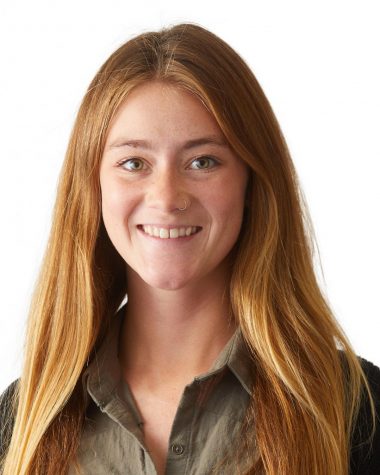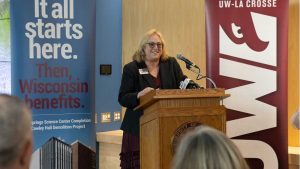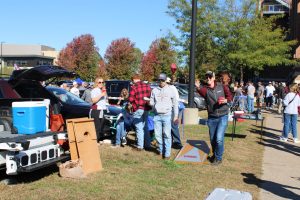Professor spotlight: Dr. Stephen Brokaw
December 4, 2019
The end of 2019 will mark Professor Stephen Brokaw’s 30 years of teaching marketing at the University of Wisconsin-La Crosse. “I started here in January of 1990,” said Brokaw. “Straight out of my doctoral program from Florida State. We loaded the truck at 76 degrees in Tallahassee and we unloaded at 16 below in La Crosse. In three days we went from 76 to 16 below.” This year will also be his last at UWL.
Brokaw is originally from Indiana. “Hot summers, relatively mild winters and then I came here,” said Brokaw. “But I came here because this is my wife’s hometown. My children have grown up 13 blocks from Grandma and Grandpa. I would never ever have contemplated this far north in my life if I hadn’t married a La Crossian. I brought her home basically and that’s why I’m still here,” said Brokaw.
Brokaw’s degrees, graduate and undergraduate, are in business administration and marketing. “At the undergraduate level, I’m also one class away from a minor in fashion merchandising believe it or not,” said Brokaw. “But I graduated into a recession and it was the beginning of the collapse of the department store retailing environment, so jobs were disappearing back in those days,” said Brokaw.
“My biggest problem in life is that I get bored easily. Once I learn how to do something I really don’t want to do it anymore,” said Brokaw. “The jobs that I had I didn’t mind doing. I learned a lot. I got to see my undergraduate degree in action. Virtually everything you can teach in a marketing program I have done on the job to some extent or another. But then I got bored and I was still pretty young to be bored. So then what are you going to do?”
After working in the marketing field for a few years, Brokaw decided to apply to a doctoral program with just a bachelor’s degree. “Florida State thankfully said, ‘I think you have promise. You will need to start in our MBA program, but you won’t have to finish the MBA. If you can prove you can do graduate level work we can move you directly into the doctoral program; and we’re willing to give you a tuition waiver and a graduate assistantship.’ And that’s what I did,” said Brokaw.
When asked how he kept his job at UWL for 30 years without getting bored, Brokaw said, “Because every 15 weeks I get a new batch of students and when I walk into the classroom I’m confronted with a whole new set of faces and personalities that I don’t know yet and I have 15 weeks to get to know them. If you do that, well this happens to your office,” said Brokaw, looking around at the letters and photos from his past students that have stayed in contact.
“These boxes up here, they’re filled with the same stuff.” Said Brokaw, referring to boxes stacked on shelves throughout his office. “I have quite a few that stay in touch. That makes me feel good. I use it as a sign that I didn’t waste their time. I’d like to think that it’s an indication as a marketer, I have the capacity to build relationships, which is much of what marketing is really about. I like to get to know them as individuals,” said Brokaw.
Brokaw went on to say, “The followup to it is that life after La Crosse goes on and people reach their goals, which is ultimately what this is all about. I don’t see the degree as an end. It’s a means to an end. And the ultimate end is not business success or whether or not you end up being a vice president of a corporation; it’s about life success and are you happy with where you’ve ended up,” said Brokaw.
“I don’t really worry about where people go to get a job. We’ve had people that are corporate focused; they want to climb. They’ve done extremely well. Then we have some that, ‘That’s not me’. They work for non-profits, they make almost no money at all, but, boy, they enjoy their jobs. That’s all that really matters—people happy. These people are happy,” said Brokaw, nodding back towards the letter-filled walls of his office.
When asked what changes he’s noticed since starting 30 years ago, Brokaw said, “Number one: you all carry a smartphone; number two: you can’t seem to live without your smartphone. You’re all wired all the time. You get up with it in the morning, you go to bed with it at night, it’s in your hand all day long and it drives you nuts when you don’t know where your phone is.”
“I just wonder about personal interrelationships sometimes–when I see a group of students at a local bar or eatery and they’re all looking at their damn phone. Why did you bother? Put your phone down and look at the person across the table from you and have a conversation,” said Brokaw, who doesn’t carry a cell phone. “I don’t want one,” he said.
The other change Brokaw noted was the amount of loan debt students leave UWL with. “In my day, there were those of us that needed student-loan help to get through, but 70 percent of our student population now has student loan debt and the average is almost 30,000 dollars,” said Brokaw.
Brokaw expanded on the shift in post-graduates’ expectations, “The freedom of movement that we’ve always assumed new graduates are going to have—the whole, ‘the world is your oyster’ sort of idea is kind of being lost, because [graduates] have to find something fairly quickly and the whole idea of really pursuing your dream, is going to be lost a little bit because they’re restrained financially at the age of 22, 23. And that bothers me a lot,” said Brokaw.
Brokaw will be retiring in December of 2020. “I’m not sure what I’m gonna do next; I’m not sure I care,” said Brokaw.







